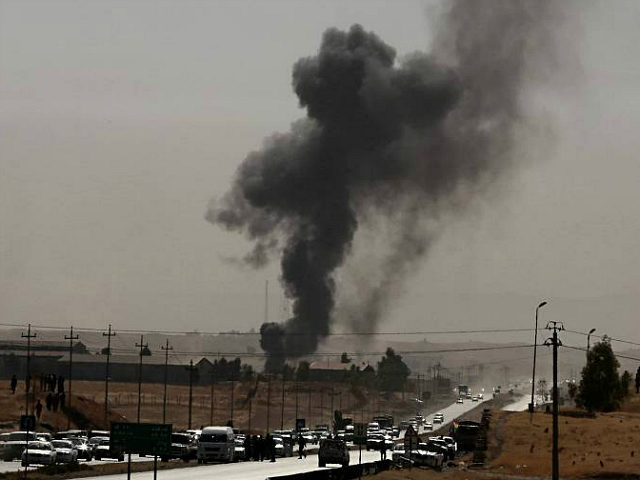The Patriotic Union of Kurdistan (PUK), a minority party in the Kurdistan Regional Government (KRG) of Iraq, has warned that continued attacks by the Iraqi military and Iran-backed Shiite militias could result in another “genocide” campaign against the ethnic group.
“If the United Nations, Iraq, and the U.S. do not gain control of the situation, the flames of sectarian conflict might lead to the risk of a Kurdish genocide in the Kurdistani disputed areas,” a statement from the PUK released on Wednesday read. The party blamed “certain radical Shia armed groups that want to impose themselves” for the violence.
Following a decision by the KRG to hold a non-binding referendum asking Kurds whether they supposed independence from Iraq in September, the Iraqi government invaded disputed KRG territories around Kirkuk. The Kirkuk area is multi-ethnic and oil-rich and became a functional part of the KRG following a mass desertion by the Iraqi army, who refused to fight the Islamic State. Kirkuk never became an ISIS territory because the Kurdish Peshmerga swept in when the Iraqi military fled, saving the city and managing it until last month.
Given the weakness of the official Iraqi military, Prime Minister Haider al-Abadi chose to legalize a group of Iran-backed Shiite militias known as the Popular Mobilization Forces (PMF) before the fight to liberate Mosul from ISIS. The PMF continue to legally operate under Baghdad and have reportedly continued their invasion of the KRG beyond Kirkuk into Kurdish areas.
The PUK appear to be blaming the PMF for anti-Kurdish violence and potential genocidal activity.
The PUK warning comes as multiple outlets denounce campaigns to ethnically cleanse areas around Kirkuk of Kurdish and non-Arab populations. The Kurdish outlet Bas News reported Wednesday that Baghdad-backed forces have “begun the process of Arabization of Tuz Khurmatu and Kirkuk through the Iran-backed Shi’ite militias of Hashd al-Shaabi [PMF].” Specifically, the Iraqi government appears to be moving the families of PMF fighters into those regions and displacing local residents to make room, according to the report.
The term “Arabization” is a loaded one for Iraqi Kurds, who a generation ago suffered such a campaign under dictator Saddam Hussein. An Iraqi court charged Hussein with the crime of genocide in 2004 after his capture for the launch of an “Arabization” campaign in Kurdish territory that killed at least 50,000 people in the 1980s. As the Associated Press noted this week, Kirkuk was one of the regions targeted by the Hussein genocide campaign. While Iraqi officials now insist that Kirkuk was never a part of Kurdistan, “the multi-ethnic city was targeted for the ruling Baath Party’s notorious Arabization campaigns that drove Kurds out of urban centers in northern Iraq and into their present enclave in the northeast.”
A Human Rights Watch report noted also that the Saddam Hussein campaigns against the Kurds were often followed by the mass resettling of Arab Iraqis into the regions where the Kurds had been purged. “For the hundreds of thousands of Kurds displaced from their homes by Arabization, armed conflict, and genocide in Iraq, their continued displacement represents a crime that must be redressed,” the report read in 2004, over a decade ago.
The mayor of Tuz Khurmatu, Shalal Abdul, told Bas News that he fears Iran-allied Baghdadi officials “are planning to once again Arabize Kirkuk and change the demography of the city.”
The NGO Amnesty International has also sounded the alarm on the situation in Tuz Khurmatu, releasing a report this week featuring witness testimonies from displaced Kurds who have lost their homes in the fighting. “Thousands have lost their homes, shops and everything they owned. They are now scattered in nearby camps, villages and cities, wondering whether they will ever be able to return,” Lynn Maalouf, Director of Research for the Middle East at Amnesty International, said in a statement.
Witnesses say PMF members were going door-to-door in Kurdish neighborhoods, looting homes, and burning down anything that they could not use.
“More than 100 people on motorcycles were riding around the neighborhood. … They took anything valuable or worth something. Then they set fire to a blanket and threw it into the house,” one witness said.
“I saw trucks and lorries [driven by] the PMU [PMF] and Turkmen. The Turkmen are PMU anyway. They would take kitchen counters, fridges, stoves—whatever they can,” the witness continued.
The PUK urged the ruling government of the KRG to consider alternatives to holding the referendum in September, given that the KRG had failed to gather any international support for the vote. The United States did not support the vote and has not aided the Peshmerga in protecting KRG territory during the PMF invasion, despite the Peshmerga’s standing as one of the most reliable American allies on the ground against the Islamic State.

COMMENTS
Please let us know if you're having issues with commenting.